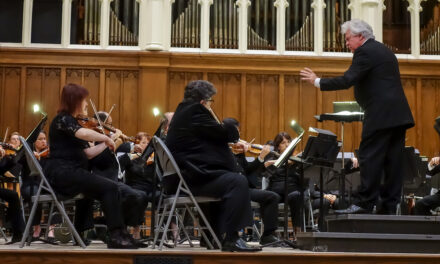As a theatre practitioner, it seems that contemporary theatre is fraught with the word “Brechtian,” and rightfully so. This word is in reference to the theories of German theatre practitioner and poet Bertolt Brecht, who advocated for an “Epic theatre” in which actors broke the veil between themselves and the audience to provide a deeper, self-reflective experience. Artists are noticing the world’s strife, and they want to put it on stage, so they turn to the works of Bertolt Brecht to rediscover how to strip down a production to its essentials and inspire a catharsis in the audience. Though this method is compelling to theatre-makers immersed in the field, the word “Brechtian” may be meaningless to an audience just wanting entertainment when the production actively seeks to create a powerful experience for them. Too often, artists present Brechtian works in a lofty, refined manner, out of reach for the average audience member and negating Brecht’s intent of leading them to catharsis. So, it came as an extremely welcomed surprise that the University of North Carolina School of the Arts‘ production of Mother Courage and Her Children succeeded in fighting against this all-too-frequent stumbling block.
At first, I thought this might’ve not been the case. I was interested that UNCSA had chosen to present this piece on a large thrust stage. Brechtian works, like Mother Tongue at UNCSA last year, are often found in smaller venues or black box theaters. The intimacy of smaller staging can aid the audience’s path to self-reflection due to their closeness to the actors. This production did not suffer from the choice of a larger venue at all; some technical choices helped make it such a success. The scenic design by Nikolas R. Serrano followed all the Brechtian ideals that remind audiences that they are watching a representation of reality, not reality itself. The set was extremely minimal, with large pieces of cloth draped around the stage to represent changes in place. The largest, most intricate design came in the form of Courage’s wagon. This choice paid off well, as the almost cartoonish size of this piece became more and more of a burden throughout the show. This created a striking picture in the final moments of the play when Courage drags her wagon across the shoes of all who have died in the war. The lighting design by Stephen Smart added particular heat to moments like this throughout the show. Most of the lighting was warm and intense, nothing too stark or complex that would negate the reflective nature of the production.
Truly, this production’s greatest success was in selecting such a powerful yet digestible translation by Tony Kushner. This text was entertaining and moving, sorrowful and humorous, often changing moods in the flash of a second. This required great emotional flexibility from the cast, and they delivered.
Alyssa James, as Mother Courage herself, showed admirable stamina as she navigated the war-riddled world with profound honesty. I would also note the production choice not to amplify the actors’ voices, again a Brechtian choice, led to interesting vocal qualities that were highly characteristic and immersive despite the bare-bones, literal world created on the stage. Another notable performance was that of Shreya Muju as Kattrin, Mother Courage’s mute daughter. Muju’s physicality for this character transformed her as a force beyond her vocal limitations.
This production certainly requires flexibility from its creators as they work against the many theatrical qualities we may think are “inherent” to the art form: complex sets, realistic lighting, and containment within the fourth wall. However, it also asks for flexibility from its audiences by making them believe the action on stage is really a mirror of the world. Brecht wrote Mother Courage during a time of fascism and the beginnings of war. The world may have modernized, but the struggles, as we have seen throughout the violent events of this week, remain the same. This production is an extremely topical choice that speaks to the losses we face as a modern society. It may not offer a solution to our woes, but instead, it recognizes the grief within us is the same as the grief within the characters of the play. Perhaps that is all we can ask theatre to do at this time of life during wartime.
UNCSA’s production of Mother Courage and Her Children continues at the Freedman Theatre through Sunday, April 9. For more details on this production, please view the sidebar.











